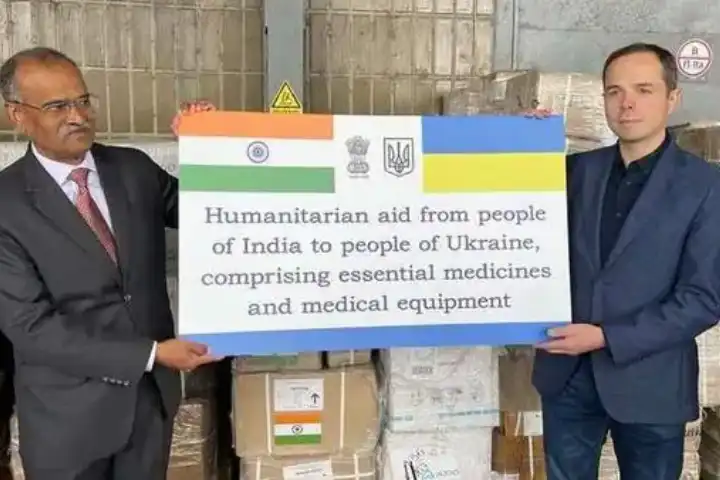As India is making steady strides as a rising world power, there seems to exist one lacuna that New Delhi must fill to firm up in its humanitarian approach in world affairs – the establishment and use of philanthropy, or charity, as a tool of foreign policy. Many leading and developing countries are supportive of and foster international charities and welfare foundations working on many fronts throughout the globe.
Besides UN-affiliated organisations, some notable international charities or philanthropy outfits that are active today are Melinda and Bill Gates Foundation, Clinton Global Initiatives, Medicines Sans Frontiers, The Salvation Army, The Hunger Project, White Helmets, Muslim World League, Turkish Cooperation and Coordination Agency (TIKA), among others.
Scenes from our teams’ response to artillery shelling by regime forces that targeted the town of Ahsim in Jabal Al-Zawiya, south of #Idlib, on Tuesday morning, August 22, resulting in the injury of 3 civilians, including a child, and a car fire.#Syria #WhiteHelmets pic.twitter.com/zQLPmBOZPI
— The White Helmets (@SyriaCivilDef) August 22, 2023
Philanthropic organisations are believed to play a pivotal role in world politics and some experts of international relations believe that it’s time India established itself as a rising power with a big heart. “There is a principle of giving and it works to enhance the image of countries and even help play a role in subduing conflicts. If India raises an international organization for this purpose, it will surely supplement its role as an emerging geo-political and geo-economic power,” said Rahees Singh, a commentator of international relations and advisor to UP CM Yogi Adityanath.
Singh added that private Indian charities such as Azim Premji Foundation and International Society for Krishna Consciousness (ISKCON) are already doing work both in India and abroad. “I don’t exactly know the nature and scale of their work, but any welfare work brings a lot of goodwill for the donating or helping country,” he added.
Similarly, a West Asia expert told India Narrative that it would help India achieve several foreign policy objectives, but he was also apprehensive that India would also have to reciprocate by recognising and allowing to work similar organisations in India.
“If India ventures out to promote and expand its own charity, it’ll ease out curbs on charities that have faced embargos on their functioning in India. TIKA of Turkey and Islamic Development Bank of Saudi Arabia are not allowed to operate in India. So, before embarking on such an endeavour, India will have to first establish bonhomie with the world,” he said.
He added that based on his experience of travelling in different parts of the world and teaching in Turkey for several past years, he has seen increasing warmth for India’s soft power in world relations and a world-level charity will be an appropriate addition in that direction.
Professor Swaran Singh of JNU agreed with the idea of charities playing positive roles in world politics, but he said that it would be too immature to comment on Indian charity playing a global role. “It’s a mere hypothesis right now. Let it germinate concretely first,” he told India Narrative.
The issue of a world-level Indian brand of charity has been abuzz in policy makers and think tank foreign policy czars. India has continuously helped mitigate several crises and conflicts through humanitarian assistance and opening credit lines to countries in dire straits.
“India is chairing a grouping like G20. It’s a key cog of BRICS. Its Prime Minister is rated as one of the most popular and powerful heads of state. Its economy is prospering despite acute challenges. It is helping countries in need. So, why shouldn’t India have an organisation that is known as an international charity? It may not necessarily be a government organ. It could be run by philanthropist donations from big business houses and private donors,” said a scholar at Indian Council for World Affairs (ICWA).
ISKCON (Hare Krishna community) members are speaking and organizing workshops on Bhakti Yoga practices and other topics at the Parliament of World Religions in Chicago, USA.@InterfaithWorld pic.twitter.com/6e6VVLrfkB
— ISKCON (@iskcon) August 17, 2023
Philanthropy as Policy
Last week, the Emirates Red Crescent, a fledgling welfare foundation, announced that it would build houses for a section of Syria war victims. Already, some Iranian welfare organisations are doing the same. Similarly, the White Helmets, whose story has been documented by Netflix, have been functioning in the war-torn country for long. Its charitable role in the conflicts has been dubbed dubious by the Syrian government, Iranian government, Russian government and even Chinese media. However, it illustrates how philanthropy missions play a smooth role in achieving certain foreign policy objectives when direct diplomacy is not possible.
The role of such philanthropy organisations runs parallel to humanitarian aid announced and delivered by countries. According to international relations scholarship, as also highlighted in comments of experts quoted above, the role of philanthropy in global politics is deep-rooted and it also helps or hampers relations between countries.
“Philanthropic organisations have the power to shape and alter the global political agenda – and can do so in ways distinct from other types of non-state actors. In order to wholly appreciate the dynamics of global governance in the current era and understand the dynamics of global governance in the future, it is imperative that International Relations incorporate philanthropy as an important force in global politics and philanthropic organisations as relevant actors for analysis. This does not mean that philanthropic organisations are replacing states; rather, philanthropic organisations augment the exercise of international relations,” wrote Professor Jeremy Youde of Australian National University in his paper on the “the role of philanthropy in international relations.”




















